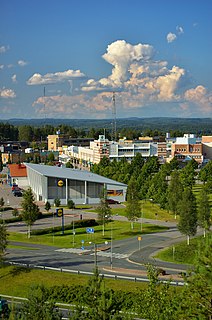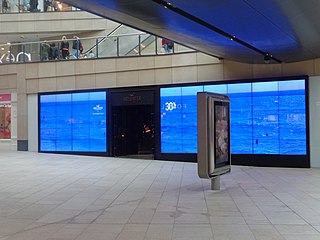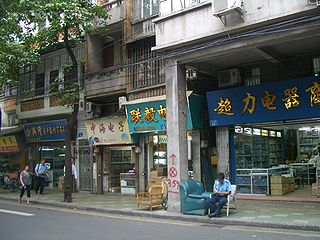Business is the practice of making one's living or making money by producing or buying and selling products. It is also "any activity or enterprise entered into for profit."

A supermarket is a self-service shop offering a wide variety of food, beverages and household products, organized into sections. This kind of store is larger and has a wider selection than earlier grocery stores, but is smaller and more limited in the range of merchandise than a hypermarket or big-box market. In everyday U.S. usage, however, "grocery store" is synonymous with supermarket, and is not used to refer to other types of stores that sell groceries.

Marketing is the process of exploring, creating, and delivering value to meet the needs of a target market in terms of goods and services; potentially including selection of a target audience; selection of certain attributes or themes to emphasize in advertising; operation of advertising campaigns; attendance at trade shows and public events; design of products and packaging attractive to buyers; defining the terms of sale, such as price, discounts, warranty, and return policy; product placement in media or with people believed to influence the buying habits of others; agreements with retailers, wholesale distributors, or resellers; and attempts to create awareness of, loyalty to, and positive feelings about a brand. Marketing is typically done by the seller, typically a retailer or manufacturer. Sometimes tasks are contracted to a dedicated marketing firm or advertising agency. More rarely, a trade association or government agency advertises on behalf of an entire industry or locality, often a specific type of food, food from a specific area, or a city or region as a tourism destination.

Sales are activities related to selling or the number of goods sold in a given targeted time period. The delivery of a service for a cost is also considered a sale.

Inventory or stock refers to the goods and materials that a business holds for the ultimate goal of resale, production or utilisation.

Retail is the sale of goods and services to consumers, in contrast to wholesaling, which is sale to business or institutional customers. A retailer purchases goods in large quantities from manufacturers, directly or through a wholesaler, and then sells in smaller quantities to consumers for a profit. Retailers are the final link in the supply chain from producers to consumers.

Distribution is one of the four elements of the marketing mix. Distribution is the process of making a product or service available for the consumer or business user who needs it. This can be done directly by the producer or service provider or using indirect channels with distributors or intermediaries. The other three elements of the marketing mix are product, pricing, and promotion.
Market research is an organized effort to gather information about target markets and customers: know about them, starting with who they are. It is an important component of business strategy and a major factor in maintaining competitiveness. Market research helps to identify and analyze the needs of the market, the market size and the competition. Its techniques encompass both qualitative techniques such as focus groups, in-depth interviews, and ethnography, as well as quantitative techniques such as customer surveys, and analysis of secondary data.

Disintermediation is the removal of intermediaries in economics from a supply chain, or "cutting out the middlemen" in connection with a transaction or a series of transactions. Instead of going through traditional distribution channels, which had some type of intermediary, companies may now deal with customers directly, for example via the Internet.

In the United States, a car dealership is a business that sells cars. A car dealership can either be a franchised dealership selling new and used cars, or a used car dealership, selling only used cars. In most cases, dealerships provide car maintenance and repair services as well as trade-in, leasing, and financing options for customers.
Relationship marketing is a form of marketing developed from direct response marketing campaigns that emphasizes customer retention and satisfaction rather than sales transactions. It differentiates from other forms of marketing in that it recognises the long-term value of customer relationships and extends communication beyond intrusive advertising and sales promotional messages. With the growth of the Internet and mobile platforms, relationship marketing has continued to evolve as technology opens more collaborative and social communication channels such as tools for managing relationships with customers that go beyond demographics and customer service data collection. Relationship marketing extends to include inbound marketing, a combination of search optimization and strategic content, public relations, social media and application development.
Drop shipping is a form of retail business wherein the seller accepts customer orders without keeping stock on hand. Instead, in a form of supply chain management, the seller transfers the orders and their shipment details to either the manufacturer, a wholesaler, another retailer, or a fulfillment house, which then ships the goods directly to the customer. As such, the retailer is responsible for marketing and selling a product, but has little or no control over product quality, storage, inventory management, or shipping. By doing this, it eliminates the costs of maintaining a warehouse – or even a brick and mortar storefront, purchasing and storing inventory, and employing necessary staff for such functions. As in any other form of retail, the seller makes their profit on the difference between an item's wholesale and retail price, less any pertinent selling, merchant, or shipping fees accruing to them.

Personal selling occurs when a sales representative meets with a potential client for the purpose of transacting a sale. Many sales representatives rely on a sequential sales process that typically includes nine steps. Some sales representatives develop scripts for all or part of the sales process. The sales process can be used in face-to-face encounters and in telemarketing.

Business-to-business is a situation where one business makes a commercial transaction with another. This typically occurs when:

A wrecking yard, scrapyard or junkyard is the location of a business in dismantling where wrecked or decommissioned vehicles are brought, their usable parts are sold for use in operating vehicles, while the unusable metal parts, known as scrap metal parts, are sold to metal-recycling companies. Other terms include wreck yard, wrecker's yard, salvage yard, breaker's yard, dismantler and scrapheap. In the United Kingdom, car salvage yards are known as car breakers, while motorcycle salvage yards are known as bike breakers. In Australia, they are often referred to as 'Wreckers'.
Industrial marketing is the marketing of goods and services by one business to another. Industrial goods are those an industry uses to produce an end product from one or more raw material. The term, industrial marketing has largely been replaced by the term B2B marketing.
A marketing channel consists of the people, organizations, and activities necessary to transfer the ownership of goods from the point of production to the point of consumption. It is the way products get to the end-user, the consumer; and is also known as a distribution channel. A marketing channel is a useful tool for management, and is crucial to creating an effective and well-planned marketing strategy.

Real estate development, or property development, is a business process, encompassing activities that range from the renovation and re-lease of existing buildings to the purchase of raw land and the sale of developed land or parcels to others. Real estate developers are the people and companies who coordinate all of these activities, converting ideas from paper to real property. Real estate development is different from construction or housebuilding, although many developers also manage the construction process or engage in housebuilding.

The Materials Processing Institute is a research centre serving organisations that work in advanced materials, low-carbon energy and the circular economy. The Institute is based in Tees Valley in the northeast of England.
The retail format influences the consumer's store choice and addresses the consumer's expectations. At its most basic level, a retail format is a simple marketplace, that is; a location where goods and services are exchanged. In some parts of the world, the retail sector is still dominated by small family-run stores, but large retail chains are increasingly dominating the sector, because they can exert considerable buying power and pass on the savings in the form of lower prices. Many of these large retail chains also produce their own private labels which compete alongside manufacturer brands. Considerable consolidation of retail stores has changed the retail landscape, transferring power away from wholesalers and into the hands of the large retail chains.